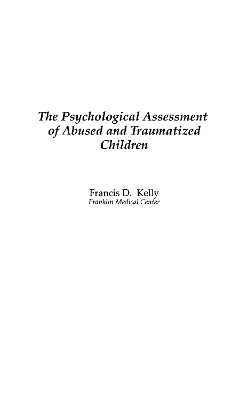
The Psychological Assessment of Abused and Traumatized Children
Routledge (Verlag)
978-0-8058-2973-0 (ISBN)
The past decade has seen more and more clinicians involved in the assessment and treatment of abused and traumatized children. They have contributed to an impressively large body of literature on the impact of abuse and trauma at all ages, the focus of which has been the short and long-term sequelae apparent in the child's behavior, emotional experience, and social interaction. But there have been few efforts to investigate the ways in which abuse and trauma damage the intrapsychic systems and structures that often guide, direct, and inform the child's manifest adjustment and functioning. The need to redress the balance was the major impetus for this book.
Kelly offers a clinical paradigm for the personality assessment of abused or traumatized children via projective instruments--the TAT and Rorschach--and shows how various projective measures and indices can be utilized as sensitive barometers of changes in self, object, and ego functioning following therapeutic interventions and other corrective experiences. But further, integrating the tenets of trauma theory and those of psychoanalytic theory, he sets this clinical paradigm in a meaningful theoretical context, and draws on both theory and clinical experience to develop a comprehensive psychological composite of the child who has been maltreated.
Part I provides an overview of theoretical models relevant to the assessment and diagnosis of the maltreated child. Contemporary psychoanalytic theory serves as one frame and is discussed first, with particular emphasis on object relations and ego functions. Equal attention is devoted to developmental psychology as another frame.
Part II reviews relevant research. The Mutality of Autonomy Scale (MOA) and the Social Cognition and Object Relations Scale (SCORS) are introduced as examples of reliable and valid instruments readily employed to assess the impact of abuse or trauma on a child's object relations functioning. Additional Rorschach indices--boundary disturbance measures, thought disorder indices, trauma markers, and defensive functions measures--are discussed as measures of the impact on different facets of ego functioning. These various projective measures can be utilized as sensitive barometers of changes in self, object, and ego functioning following therapeutic interventions and other corrective experiences.
Part III includes a variety of extended clinical illustrations.
Seven cases of boys and girls subjected to varying degrees of abuse and trauma are presented to demonstrate the clinical utility of projective material for assessment, diagnosis, and treatment planning. For the clinician who takes the idiographical-phenomenological approach, appropriate given the uniqueness of each situation of abuse or trauma and the frequent brevity and barrenness of the protocol, such material can open a window onto a rich vista of the child's psychological terrain. The resulting map can point the way to wise decisions about type, timing, and level of therapeutic intervention, the resolution of such process issues as transference and countertransference, plus additional questions.
Two cases of adult women who were abused as children and find themselves continuing to struggle with enduring unresolved issues vis a vis their own children are also presented. These cases underscore the value of TAT and Rorschach material, and object relations measures, in assessing and understanding the abusive and potentially abusive parent.
Francis D. Kelly (Author)
Contents: Preface. Introduction. Part I: Young Children and the Experience of Trauma and Abuse. The Representational World of the Young Child: The Role of the Four Psychologies. Object Relations Development in Abused and Traumatized Children: Theoretical and Clinical Considerations. Part II: The Psychological Representation of Abuse and Trauma. Object Representation Assessment of Children: TAT and Rorschach Research in Relation to the Abused and Traumatized Child. Object Representation Scales. Old Wine in New Bottles--The Borderline Child Revisited: Contemporary Perspectives on Diagnosis and Assessment. Three Faces of Abuse and Trauma: The Sequelae of Physical, Sexual, and Complex, Chronic Experiences of Maltreatment. The Abused and Traumatized Child: Changes in Object Relations and Ego Functions--The Influence and Impact of Therapeutic and Mutative Experiences. Object Representations of Abusive and Maltreating Parents: A Tale of Two Women. Concluding Remarks.
| Erscheint lt. Verlag | 12.4.1999 |
|---|---|
| Verlagsort | New York |
| Sprache | englisch |
| Gewicht | 589 g |
| Themenwelt | Geisteswissenschaften ► Psychologie ► Entwicklungspsychologie |
| Geisteswissenschaften ► Psychologie ► Klinische Psychologie | |
| Geisteswissenschaften ► Psychologie ► Psychoanalyse / Tiefenpsychologie | |
| Geisteswissenschaften ► Psychologie ► Test in der Psychologie | |
| Medizin / Pharmazie ► Medizinische Fachgebiete ► Notfallmedizin | |
| Sozialwissenschaften ► Soziologie | |
| ISBN-10 | 0-8058-2973-3 / 0805829733 |
| ISBN-13 | 978-0-8058-2973-0 / 9780805829730 |
| Zustand | Neuware |
| Haben Sie eine Frage zum Produkt? |
aus dem Bereich


